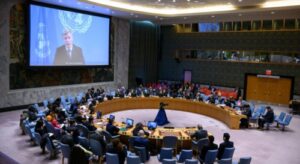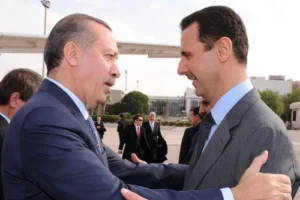
The National Interest Foundation Newsletter
Issue 175, January 19, 2023
Welcome to our NIF Newsletter. In this week’s headlines: the Israeli firm Cognyte sells spyware to Myanmar, the United Nations special envoy indicates a new truce in Yemen may be on the horizon, and Turkey and Syria indicate they aim to meet soon to discuss reconciliation between the former allies.
Israeli Firm Cognyte Sold Spyware to Myanmar

Israeli spyware firms have a long history of selling cyberweapons to repressive regimes. (Photo by Reuters)
Israel’s Cognyte Sold Intercept Spyware to Myanmar a Month Before the 2021 Military Coup
According to recently revealed documents, the Israeli spyware firm Cognyte Software sold intercept spyware to a telecommunications firm linked to the Myanmar military. The documents were obtained by the NGO Justice For Myanmar. This sale occurred just a month before the junta launched a military coup in February 2021. The deal was finalized despite a 2017 Israeli Supreme Court ruling banning Israeli firms from making defense technology transfers to Myanmar. Although the U.S. and EU imposed an arms embargo on Myanmar, Israel initially refused to stop the sale of arms to Myanmar. This even continued as Myanmar pursued genocidal policies towards its Rohingya minority in 2016 and 2017. After intense public pressure. Israel claimed to have halted exports in 2018. Israel’s Defense Ministry has not responded to questions of whether or not they had approved the sale. The spyware purchased gives the authorities the ability to hear calls, read messages, and even track locations. Eitay Mack, an Israeli human rights lawyer, has called for a criminal investigation against Cognyte and unnamed government officials who facilitated the sale. The document indicated that at the time of the purchase, Myanmar intended to install spyware into all of the country’s telecommunications provider’s systems. An investigation conducted by Facebook owner Meta Platforms indicated that this was not an isolated incident. There have also been instances of spyware being used in a wide range of countries, including Kenya, Mexico, and Indonesia, where it is used to spy on journalists and politicians.
Cognyte has had a long history of selling advanced monitoring technology to repressive regimes. These past sales were to Azerbaijan, Indonesia, South Sudan, Uzbekistan, and Kazakhstan. The company has a long history of aiding repressive regimes in violating human rights, and it is unclear why they are still allowed to operate. This is also not the first time an Israeli firm has come under scrutiny for the sale of spyware to authoritarian regimes. The cyber-arms company NSO Group has also been condemned multiple times for the sale of their spyware, Pegasus, to less than democratic countries. Pegasus allows the user to access a target’s phoneremotely, giving them access to everything on the phone, from photos to the microphone. Pegasus uses a zero-click attack, meaning that the spyware requires no user interaction to operate. It is evident from the document that Cognyte was aware of what the spyware would be used for.
Though some type of spyware is employed by nearly every country, there is usually some kind of legal process to assure human rights are not violated, however, repressive regimes, such as the military junta in Myanmar, rarely if ever employ these legal safeguards, opting instead to simply deploy them whenever those in power choose. These spywares are used to suppress pro-democracy institutions, arrest political rivals and journalists, crush protests, and ensure loyalty throughout their governments. It creates a chilling effect among would-be democratic activists, as they know that they could be under constant surveillance.
This spyware is a danger to democratic institutions across the world and must be regulated. Companies with a pattern of selling spyware to repressive governments need to be criminally investigated for aiding and abetting crimes against humanity. Increased accountability and oversight are the only surefire way to ensure that these firms do not sell malicious software to authoritarian regimes.
UN Envoy Hopeful for Truce in Yemen

The UN special envoy to Yemen has signaled that a new truce is possible. (Photo from UN)
United Nations Envoy in Yemen Indicates New Truce May be Agreed Upon
United Nations special envoy in Yemen, Hans Grundberg, indicated to the UN Security Council that prospects for a renewed truce in Yemen continue to grow. The Swedish diplomat pointed to multiple indications that the situation in Yemen may begin to shift toward peace. Chief among these is the fact that even after the original truce expired three months ago, fighting has not escalated. The military situation is relatively stable. Grundberg believes this to be an important opportunity for the warring parties to work together towards “a shared vision” by restoring peace to Yemen. Saudi officials have also indicated that they are seeing progress towards ending the war in Yemen as well. Back-channel talks have been revived between Saudi Arabia and the Houthi rebels. The country has been at war since 2014, when Houthi forces seized the capital of Sanaa, forcing the government to flee the country. In 2015, A Saudi-led coalition, including the United Arab Emirates, intervened, launching an airstrike campaign to restore the government to power. The UN estimates that 377,000 people have been killed during the war. The war has evolved since then into a multifaceted conflict with several parties vying for power. The situation on the ground remains fluid, with small skirmishes taking place between Houthi and government forces, often resulting in civilian casualties.
The 6-month long, UN-back truce initially went into effect in April of 2022. The deal temporarily put a stop to the fighting and allowed for much-needed fuel and humanitarian supplies to enter. Commercial flights were also allowed from Sanna, letting people with serious medical conditions leave to receive treatment that could not be given to them in the war-torn country. This truce was followed for the most part, with brief, isolated fighting taking place in some areas. The truce was extended twice but lapsed in October of last year. After the truce expired, relative peace remained. Current negotiations are extremely complicated, as they need to include a wide variety of actors. Saudi Arabia has developed a roadmap toward peace, which has the backing of the United States and the UN. In it, the coalition promises, among other things, to further reopen the airport in Sanaa and ease a blockade on the port city of Hodeida. The Houthis have demanded the collation pay salaries of state employees from oil and gas revenue, as well as the opening of all airports and ports under Houthi control. Despite the ongoing peace talks, both sides are still reequipping for another round of fighting.
The intensification of diplomatic efforts should be encouraged. As the warring parties work towards a peace deal, it is important to remember the challenge that comes after peace. Yemen is the poorest country in the Arab world and is now flooded with a vast quantity of weapons. Coupling this with sparse resources will almost certainly lead to mass instability. It is important that whatever government emerges from negotiations be equipped to guide their people through the ongoing hardship. It is also very important that a form of transitional justice take place. Parties on both sides have committed unspeakable acts against civilians. Those responsible must be held accountable if the country is to heal from this nearly decade-long conflict.
Turkey and Syria Aim to Meet

Pictured here, former allies Assad and Erdogan have been at odds since Turkey backed Syrian opposition forces. (Photo from Reuters)
Top Diplomats from Syria, Turkey, and Russia Aim to Meet Soon to Discuss EndingtheOccupation
Turkey is pushing for a second round of high-level talks to discuss reconciliation between itself and Syria. The two governments have been at odds ever since Turkey decided to support anti-government forces in Syria in 2011. Over the past decade, Turkey has backed multiple rebel groups and even deployed troops in northern Syria. One of the most current operations was a bombing campaign against groups in Syria in retaliation to a deadly bombing in Istanbul in November of 2021. Turkey also mounted a land operation targeting what it said was a wing of the Kurdistan Workers Party (PKK). The PKK is an armed group that has waged war against Ankara for decades. They now occupy land in northern Syria in a so-called “security corridor.”
The Turkish and Syrian defense ministers met in Russia last month in an attempt to repair bilateral relations and to discuss counter-terrorism efforts in Syria. This was the first time in 11 years that the two countries had held open talks. One of the main subjects during this talk was Turkish military presence within Syria. During this meeting was also when Turkish President Recep Tayyip Erdogan first proposed a trilateral meeting between himself, Syrian President Bashar al-Assad, and Russian President Vladimir Putin. So far, this meeting has not been scheduled, though some sources indicate that it may take place sometime in February. Turkey and Syria will face major obstacles to normalization, as Turkey has rejected many of Syria’s core demands, including designating all Syrian rebel groups as terrorists. Syrians also do not appear willing to work against Syrian Kurdish affiliates of the PKK. Turkey also wants Syria to help with the return of at least one million Syrian refugees, a demand Syria has shown little interest in meeting. According to sources familiar with the planning for the meeting, Russia has been putting heavy pressure on both sides to engage with each other.
Syrian President Bashar al-Assad has indicated in speeches that he is open to another round of talks but emphasizes that they must be based on the aim of ending the Turkish occupation of Syrian land. A peace agreement would significantly alter the situation in Syria. Turkey has been the primary supporter of Syrian opposition forces during the decade-long war. The conflict has killed hundreds of thousands of people and displaced millions. The government forces currently hold a large majority of the country, but opposition fighters still control a pocket in the northwest. These fighters heavily depend on support from Turkey and without it would likely collapse. This would allow Assad’s forces to take the rest of the land and potentially put an end to the conflict, though it is likely that some type of insurgency would persist. If lasting peace is to be achieved, Assad must be held accountable for his crimes against humanity. Another region of Syria is also controlled by US-backed Kurdish fighters, but so far, it has not been proposed that the United States join the talks.
